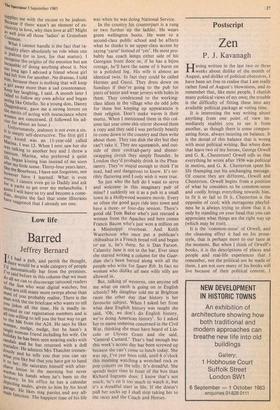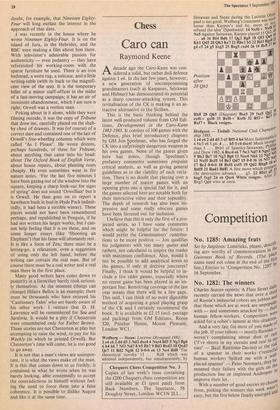Postscript
Zen
P. J. Kavanagh
'Waving written in the last two or three 'weeks about dislike of the month of August, and dislike of political obsessives, I have been set free to realise that I am really rather fond of August's blowsiness, and to remember that, like most people, 1 cherish many political views of my own; the trouble is the difficulty of fitting these into any available political package at voting time.
It is interesting the way writing about anything from one point of view im- mediately enables you to see it from another, as though there is some compen- sating force, always insisting on balance. It is the denial of this balance that is wrong with most political writing. But where does that leave two of my heroes, George Orwell and G. K. Chesterton? Orwell tells us that everything he wrote after 1936 was political in motive, and G. K. Chesterton spent his life thumping out his unchanging message. Of course they are different, Orwell and Chesterton. Orwell begins from a position of what he considers to be common-sense and coolly brings everything towards him, to fit it or fail to fit it. Chesterton is the opposite of cool; with outrageous playful- ness he is always trying to show that it is only by standing on your head that you can appreciate what things are the right way up (which may be true).
It is the 'common-sense' of Orwell, and the cleansing effect it had on his prose- style, that is perhaps more to our taste at the moment. But when I think of Orwell's books, it is the descriptions of places and people and real-life experiences that • I remember, not the political use he made of them. I am not sure many of his books will live because of their political content. I doubt, for example, that Nineteen Eighty- Four will long outlast the interest in the approach of that date.
.1 was recently in the house where he wrote Nineteen Eighty-Four. It is on the island of Jura, in the Hebrides, and the BBC were making a film about him there. With television's admirable passion for authenticity — even pedantry — they have refurnished his working-room with the sparse furniture he used. There is an iron bedstead, a worn rug, a suitcase, and a little writing-table (with its back to the magnifi- cent view of the sea). It is the temporary billet of a minor staff-officer in the midst of a fast-moving campaign; it has an air of imminent abandonment, which I am sure is right; Orwell was a restless man.
Poking about in it alone, while they were filming outside, it was the copy of Tribune that drew me, carefully placed on the shab- by chest of drawers. It was (of course) of a correct date and contained one of the last of Orwell's free-wheeling columns which were called 'As I Please'. He wrote dozens, perhaps hundreds, of these for Tribune, about anything that came into his head: about The Oxford Book of English Verse, about house repairs, about planting roses cheaply. He even sometimes went in for nature notes. `For the last five minutes I have been gazing out of the window into the square, keeping a sharp look-out for signs of spring' does not sound `Orwellian' but it is Orwell. He then goes on to report a hawthorn bush in bud in Hyde Park (admit- tedly, it had been a terrible winter). These pieces would not have been remembered perhaps, and republished in Penguin, if he had not written his larger works, but I can- not help feeling that it is on these, and on some longer essays (like `Shooting an Elephant') that his fame will ultimately rest. It is like a form of Zen; there must be a letting-go, a relaxation, even a suggestion of using only the left hand, before the writing can contain the real man. But of course there must be a real writer and a real man there in the first place.
Many good writers have come down to posterity in a form they barely took serious- ly themselves. At the moment (things can change) Hilaire Belloc is an example; there must be thousands who have enjoyed his `Cautionary Tales' who are barely aware of his other work. I venture that D. H. Lawrence will be remembered for Sea and Sardinia. It would be a pity if Chesterton were remembered only for Father Brown.
Those stories are not Chesterton at play but attempting to raise the wind, to pay for his Weekly (in which he printed Orwell). But Chesterton's time will come, he is too good to go away.
It is not that a man's views are unimpor- tant, it is what the views make of the man.
It is this that comes down to us freshly, is contained in what he wrote when he was barely looking, able contentedly to accept the contradictions in himself without feel- ing the need to force them into a false coherence, It is possible to dislike August and like it at the same time.



































 Previous page
Previous page